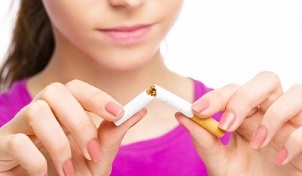
In the process of getting rid of bad habits, the most important thing is not to over-set and achieve goals. Few people can quit smoking here once and for all. This is a long process, with its own rebates and experience. All of these are related to emotional, psychological and physical characteristics. You can quit smoking by yourself, but you need to quit smoking gradually, correctly and reasonably.
Let us try to sort out all the twists and turns of this important but not easy task. Experts have developed a person who has successfully quit smoking in the form of a calendar or chart with a detailed description of the changes that occur in the body. I want to know what happens to your body when you quit smoking. Let us try to find out.
Important note: daily impact on the body
During the transition to a healthy lifestyle, adults (heavy smokers) will undergo major clinical changes in their bodies, as well as their emotional background and physical state. In the context of psychological problems and physical health, each day of quitting smoking is different from the previous day. As they said, the main purpose at this time is not to interrupt. Therefore, we will present what is happening in the form of a diary, which records many calendar days and gives a description of the current symptoms.
Quitting smoking: day one
When the final, final and irrevocable (though not the first time) decision to quit smoking is made, it is necessary to gradually "enter" the process. In order to promote the transition from an unhealthy lifestyle to a healthy lifestyle, it is important to know the behavior of the body. On the first day of the "process" of a healthy lifestyle, the weak body needs to get used to the new state and begin the recovery process. A sudden transition from one state to another can adversely affect overall health and reduce determination. This is not only a physical test, but also a psychological test.
The main things that happen in the human body when quitting smoking: the amount of carbon monoxide decreases, the transportation of red blood cells improves, and more oxygen enters the tissues. Even in appearance, the “ex” smoker enjoyed a new state on the first day after quitting nicotine. He was more active, cheerful, and confident in his own power. You can quit smoking painlessly on the first day of the course, which makes heavy smokers have determination and perseverance. This is important to overcome the craving for nicotine.
However, please do not forget that on the first day, characteristic physiological changes will occur in the body.
For example, what happens in the female body:
- slight dizziness,
- Loss of appetite
- Weaknesses
- Anxiety
- Sleep disorders,
- Insomnia.

What is the reason? An experienced smoker subjects his body to emotional psychology and physiology tests. Such a deep process is triggered, if there is no nicotine, the human body will not survive.
Quitting smoking will trigger other major changes. Nicotine is not only absorbed into the blood, but also begins to affect blood flow. Therefore, it is important to consider that, in general, it takes at least one year for the human body to quit smoking. But now, back to the quit smoking diary.
Don’t forget that on the first day of quitting smoking, characteristic physiological changes will occur in the body. For example, women will feel slightly dizzy.
Quitting smoking: the next day
At this point, decisiveness can disappoint you a bit-the attack will begin to return to old habits (at least not for a long time). For example, this is what happens in men. While fighting emotionally, the body is undergoing tremendous changes: the respiratory organs get rid of mucus and sediment, the function of ciliated epithelium is restored, the state of the gastrointestinal tract is improved, and new cells appear in the tissues. During this period, changes in the emotional level manifested in the form of euphoria and emotional excitement. But irritability also occurs. It all depends on self-hypnosis and self-discipline. Although sometimes sleepiness can be suddenly replaced by energy. The day after I quit smoking, my appetite has not fully recovered (a strange taste may appear). You may also experience shortness of breath, cough, and even stomach pain. During this period, the urge to urinate and the difficulty of falling asleep more manifested. For example, if nervous tension is aggravated due to work pressure, skin itching is natural.
Quitting smoking: the third and fourth day
Let us further consider what happens when we quit smoking. A series of factors affect the speed of body recovery. Especially general conditions and weakened immunity play a special role. Therefore, the nuances of smoking cessation treatment should be judged at the cellular level. Everyone has their own inner energy to fight addiction. Therefore, a separate approach is required. During the cleaning process, the body removes toxins. Even the structure of the cells changes, which triggers thorough cleaning.
What happened to the body these days:
- Recovery of ciliated epithelium on respiratory organs,
- The indicator of alkaline components in the pancreas increases,
- Less mucus accumulates in the stomach
- Usually, blood circulation in the heart and brain is improved.
There is a clear desire not to smoke, and the peristalsis is normal. At the same time, the "retreat" of former smokers has intensified, which has more psychological effects, and tensions have appeared. Quitting smoking seems to "have not found a place for oneself", this is a long-term habit of trouble. In this context, appetite has increased, and candies are "preempted". Sometimes the skin begins to fall off and the fingers swell. When coughing, phlegm may appear in the throat.
Quitting smoking: Day 5 and Day 6
In the process of quitting smoking, many people used a special table or calendar for convenience. Some people kept a diary and recorded their feelings in detail. This is useful when you need to identify related symptoms and changes in the body. It becomes easier in a few days, and the diary will help you prevent and analyze errors. From the fifth day to the seventh day, a former smoker noticed the following changes in his body: how the minor wounds on the skin began to heal faster; all parts of the respiratory system had recovered (the furthest part)Has also recovered); digestion has returned to normal; blood cells have eliminated nicotine at an invisible level.

Usually, the last point in the fight against addiction is on the seventh day, when a person’s physical addiction to cigarettes (smoke, smell) disappears. At the same time, there is no psychological discomfort. But don't forget the possibility of recurrence. Interference does happen. When the euphoria passes, there will be neuroticism and aggression. Even sleep problems may reappear. However, it is important to remember that this will not last long, the main phase of life-quitting smoking-has been successfully completed and there is no motivation to return to the old life.
During the "quit smoking" process, many people used a dedicated desk or calendar for convenience. Some people kept a diary and recorded their feelings in detail.
Quitting smoking: the second week
A week later, it seems that Rubicon has passed, and now you can live like a non-smoker and calmly deal with daily worries. But this rarely happens. In the first week of quitting smoking, the body must have made an important leap. However, sometimes even external factors (such as cigarette smoke when smoking nearby or even its appearance) will joke with former smokers. Therefore, it is worth sharing your plan with your friends and acquaintances so that you will not be tempted to "serve the company. "
It is worth listening to your body at the moment, it may have managed to free itself from nicotine. However, this is not the end of the process of recovering the body from nicotine addiction. You can help yourself by flipping through the former smoker’s calendar to see the obvious changes in your work. It turns out that starting from the second week, the struggle has become a purely psychological plane. In stress and sadness, active smokers will see the desire to smoke at work. One must learn not to react to this external commitment to return to the past.
What will happen at the end of the second week?
A former smoker has quit smoking for 14 days. By this time, his body will undergo the following changes: the healing of bronchitis and the renewal of platelets. Although red blood cell renewal has not yet occurred. This may be due to the performance of plant blood vessels. At the same time, you will notice that the skin tone has improved, the yellowishness of the fingers disappeared, and the acute cough gradually disappeared. The longer the smoker experiences it, the longer the symptoms will appear.
What happens in the first month of quitting smoking?
On the 30th day of quitting smoking, I started to lose weight, the upper respiratory system was fully restored, and I felt psychologically comfortable. At the same time, enthusiasm can be replaced by depression or depression. As in the first week, it’s important to relax and persevere here, because the most difficult way to quit smoking has been passed.
What will happen from the second month after quitting smoking?
From the second month of the recovery process from nicotine addiction, to the next three to four months, the former smoker (especially among women) gained more pleasant facial features and the swelling subsided. The pale gray color on the face disappeared, and the bronze-colored mosquito net. And in the third month, there was a strong recovery of blood vessels in the body. This shows that the tone of the body finally returned to normal, and the "point of indomitability" has finally passed. The physical desire for tobacco has been reduced so much that people can calmly perceive another smoker next to them without suffering. Usually, there are obvious improvements in emotional, psychological and physical aspects. Loss of appetite is no longer a sign of seizures, but just related to happiness.
What happens in the first year of quitting smoking?
Now, let us see what happens to the body after long-term smoking cessation. Six months is an important milestone. At this stage of life, when the blood and cells are almost completely cleared of toxic substances (nicotine), the doctor will notice the complete renewal of all body systems. It seems that a new breath becomes easier every day. The lungs can indeed work more efficiently. The former smoker has experienced a year of real experience. This is the period in which the initial serious results can be summarized. For example, you can congratulate the successful conclusion of the event and enjoy a nicotine-free life, which will surely yield results. Those who quit smoking can reduce the risk of heart disease and stroke by 30% to 50%; lung cancer-80%; gastrointestinal problems-70%.
Willpower, or alternatives
Many ex-smokers have a wrong idea of how easy it is to achieve goals by replacing one habit with another. But any psychoactive substance will arouse other addictive cravings. Some people changed light cigarettes, and some continued to smoke a pack of cigarettes, only in time. Of course, smokers with twenty years of experience will have more difficulty quitting than others. In this case, quitting smoking is cyclical, not sudden. In any case, only one person can free himself by giving up a habit.























